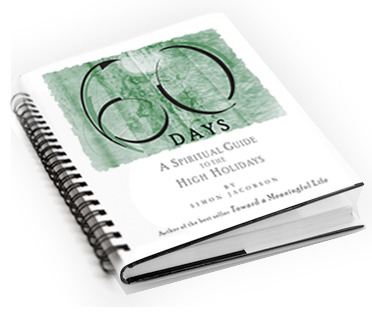Seven Weeks Toward Renewal
It’s just two weeks since I returned from Jerusalem, the lonely city that Jeremiah so sadly describes. “Oh, how she sits alone…” I return to New York, a city that was broken nearly one year ago on September 11. As I think about it, I realize that New York, and all cities of the world, have always been broken; they were just unaware of it. Jerusalem on the other hand, was and is always aware.
You see, what is whole and what is broken is not determined by the naked eye. There are many things that on the surface seem so complete, yet beneath are utterly corrupt. Being complete means being seamless. It means being connected to yourself, to your essence. If you are complete on one level but not on others, you are really broken. If you feel whole on the surface, but your inside is not connected to your outside, you are not whole at all. You are masquerading, playing a game.
This world is a broken one unless we connect it with its higher purpose. Our lives are broken – our cities shattered – unless we connect our outer life with our inner one. They always called New York “the city that never sleeps.” But just as a business is broken if it loses sight of its mission statement, New York City (the epitome of cities) is really asleep if its outer noise – and its 24 hour vivacity – is disconnected from its soul.
That’s what you feel in New York since September 11, only amplified by the shakeup of Wall Street. We feel how lost we are, how far we have wandered away – with all our prosperity and life in the fast lane – from our souls. New York, America and the entire world needed 9/11 to recognize the 911 (emergency) of our tenuous existence. Jerusalem was always aware of our existential fragility and uncertainty.
“Jerusalem” is comprised of two words: “Yirah-Shalom,” complete awe. Being the center of the universe, Jerusalem – like the central cosmic nervous system – was the first to become aware of how broken the world is without its soul connection. The Holy Temple was destroyed and Jerusalem was left barren and lonely because the world had disconnected from its purpose.
“Nothing is as complete as a broken heart,” Chassidim say. Because in a broken world the most complete thing is recognizing that we are broken. Denying that truth and convincing ourselves that we are complete when we are not, is the most incomplete thing possible.
As my mind keeps juxtaposing Jerusalem and New York, my imagination begins to drift and I remember a story…
The house is in flames. Families shattered. So many lives lost. The man of the house has left and abandoned his family.
If you are the one in pain you feel a profound loneliness. If you are only a witness, but filled with empathy, your heart breaks for all the senseless suffering. For all the oozing layers of anguish.
Sensing their pain, the husband appoints a messenger. “Go console my wife and family,” he tells the courier. “Their home has been destroyed. My wife sits alone and needs comforting.”
The wife is not consoled.
The husband sends a second distinguished messenger and yet a third. Still, to no avail. He sends all his best messengers, but the wife remains unconsoled.
“Why have you forsaken me? Why have you forgotten us,” the wife cries out.
The messengers return and share with the man the grief of his abandoned wife and family.
Finally, the husband himself appears and comforts his wife and family.
But after all the loss, simple comforting is not enough. With each passing week, the comfort grows deeper, as the healing process intensifies.
Finally, after six weeks of comforting, the woman and her family rejoice with their renewed hope.
They are then ready to enter a new stage of rebirth and renewal.
This is the story of the Seven Weeks of Comfort (‘sheva d’nechemta’) – the present period in time, as related in the haftorahs of these seven weeks. Following the destruction of the Temple and the ‘Three Weeks of Affliction,’ come the ‘Seven Weeks of Comfort,’ in which the people are consoled and comforted for their great losses.
G-d first sends His messengers, the prophets, to console Jerusalem and the people. “Nachamu Nachamu Ami, – Comfort, comfort my people… speak to the heart of Jerusalem…” (haftorah of week one).
“But Zion said (in haftorah of week two): G-d has forsaken me; My G-d has forgotten me.” Zion is not comforted by the consolation of the prophets.
The messengers return and tell G-d (in haftorah of week three): “Afflicted, storm tossed, one is not consoled” by our comforting words.
G-d then replies (in week four): “Anochi Anochi hu menachem’chem, – I, I am He who comforts you.” Not messengers, but I – yes I myself – comfort you. Why? Because the Torah says that “if a fire gets out of control…the one who started the fire must make restitution” (Exodus 22:5). Since G-d is the one that ‘started the fire” that destroyed the Temple, G-d Himself comes to comfort on the loss (Pesikta Rabsi, 30).
And G-d continues (in the haftorah of week five) – as the comfort progressively grows more powerful (see Tosafot, Megillah 31b):
“Sing barren one, you who have not given birth. Break into a song and cry aloud… for the children of the abandoned are more numerous than the children of the married… Enlarge the place of your habitat…for you will expand abroad to the right and to the left, until your descendants possess the nations and populate the desolate cities.
“Do not fear, for you will not be ashamed… You will forget the shame of your youth and the reproach of your widowhood… For your Creator is your husband… The Holy of Israel is your Redeemer. He will be called the G-d of the whole earth. For G-d called you as a wife abandoned and grieved in spirit. Can a wife of youth be rejected? Says your G-d. For a brief moment I forsook you, but I will gather you with great compassion. In an outburst of wrath, for a moment I hid my face from you; but with everlasting kindness I will have compassion on you.”
Then G-d continues, with an even greater consolation – the vision of the world’s Redemption:
“Arise, shine for your light has come, and G-d glory has risen upon you. For, behold, darkness will cover the earth and thick darkness the peoples, but G-d will arise over you and His glory will be seen upon you. Nations will come to your light, and kings to the brightness of your rising…
“Aliens will build up your walls…The sons of your oppressors will come bending to you, and all who despised you will bow down at your feet. They will call you, “The city of G-d, the Zion of the Holy one of Israel.” Though you were forsaken and hated with no one passing through you, I will make you an eternal majesty…
“Violence will no longer be heard in your land, neither desolation nor destruction within your borders…
“Your sun will no longer set, not will your moon wane. For G-d will be your everlasting light, and your days of mourning will be ended.
“Your people will all be righteous; they will possess the land forever; the branch of My planting, the work of My hands… The smallest will become a thousand, and the least a mighty nation; I, G-d, will hasten in its time.”
When the people hear these words of comfort, they reply (in the seventh and last haftorah of the Seven Weeks): “I will greatly rejoice in G-d, my soul will exult in my G-d, for He clothed me with the garments of salvation…
“For Zion’s sake I will not keep silent, and for Jerusalem’s sake I will not be still, until her righteousness shines forth like radiance… The nations will see your righteousness. And all the kings your glory…
“O Jerusalem, I have set watchmen on your walls. They will never be silent day or night… Behold G-d has proclaimed to the end of earth: Say to the daughter of Zion: Behold, your salvation comes… They will call them ‘The Holy People,’ G-d’s redeemed; and you will be called “Sought Out,” a city not forsaken.
“Who is this that comes from Edom…
“In all their affliction He was afflicted…In His love and pity He redeemed them; He lifted them up and carried them through all the years.”
Are than any better words for our times? Are there any more comforting words we can tell families shattered by today’s terrorist attacks?
Initially I was going to cite only a brief verse or two from these seven comforting Haftorahs. But as I began to write, I was amazed yet again by the glaring relevance of these verses. Especially in the last two of the seven weeks, which respectively discuss the retribution and transformation of Ishmael (Midian, Ephah, Sheba, Kedar, Nebaioth, Tarshish, Lebanon) and Edom (Esau) for the devastation they brought to the world.
As we approach the first anniversary of September 11, as the confrontation between Ishmael and Edom, with Israel in middle, continues to accelerate, the Seven Weeks of Comfort – and the resounding words of the prophets – have never been so relevant.
These weeks that lead us into the New Year; the Seventh Week is the last one before Rosh Hashana. We read these words of comfort following destruction as we enter the month of Elul, when Moses ascended Sinai for the third and final time, to prevail upon G-d to forgive the people. And prevail he would forty days later, when he descends with the Second Tablets: A testimony to the renewal after the sin of the Golden Calf and the shattering of the First Tablets.
So, instead of writing my own interpretations, what could be better than to quote the actual words of Isaiah, which speak for themselves.
Go ahead, read them for yourself and tell me what you think…








